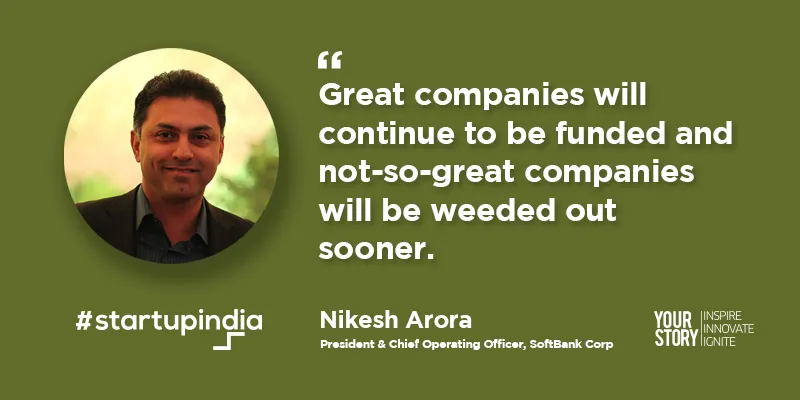Startups should solve customer problems; investment will follow: Nikesh Arora
If you go back a few months back, you’ll recall an Indian joining a Japanese investment company, which was followed by that company increasing its interest – and investments – in India. The man was Nikesh Arora; the company was Softbank. At a discussion during the Startup India Stand Up India event, the president and COO of Softbank touched upon areas that are crucial to the startup ecosystem in India. We picked 10 most important points he talked about:

Why is India his favourite destination?
“When I joined Masayoshi about 18 months back, we’re discussing of our next major market destination; that coincided with the change in the government in India, the energy which was brought to startups and huge updates in smartphones in India. India was sitting on huge potential in the next 10-15 years.”
He reiterated Uber CEO Travis Kalanick’s three Bs – Bay Area, Beijing and Bangalore – the world’s hottest investing destinations.
Lessons learnt in a startup
“In terms of lessons, whether it is big companies, or startups, or startups-turned-(into)-big companies, the lessons learnt are very similar. People who are passionate create great things, companies that aspire to solve bigger problems do much better than those who just look around for funding and money.”
Also read: Nikesh Arora unplugged
How do choose your company?
“There’s a lot of conversation during the entire day…about startups, funding, teams and other things. I think what everyone should aspire to (do is to) solve the customers’ problems (rather) than thinking about just raising funds.” He suggested that startups think of solving consumers’ issues; investment would follow in its wake.
Education is close to his heart
“Education is the top requirement. With technology, we can reshape the education. However, such technology requires a lot of partnership with the government and that makes things a bit harder.”
Expectations from the policy package
“I actually believe that we have achieved some success. We have brought so many people from various parts of the government and (the startup) ecosystem on one platform, and they are all united to address the issue. This journey is going to take a lot of time. However, we have won the first battle,” says Nikesh.
Softbank is also a big investor in solar energy
“India has a huge opportunity to leapfrog from other forms of energy to clean forms of energy.” He remarked that the government too was doing a tremendous job in the segment.
Like Masayoshi Son, Nikesh is interested in artificial intelligence
“We’re interested in artificial intelligence. But the question is how do we invest in it?”
The perennial question: Is funding in service side has overpowered funding in product side?
“The Indian startup ecosystem is still nascent. So, all of us have the responsibility to handle it with care. The year 2015 was the year of valuation and some mishaps. Now this year we will see some execution.”
Is there frothiness in the market in terms of valuation?
“Great companies will continue to be funded and not-so-great companies will be weeded out sooner.”
For how long can the deep-discount model continue?
“We aim to create customer experiences. Our message to all companies is to create a great consumer experience. We have left the question to consumers as to who they’ll choose as the market leader.”
NOW WATCH: Modi's Startup India action plan summarised in under 3 minutes!







